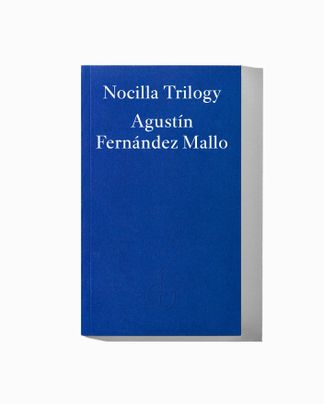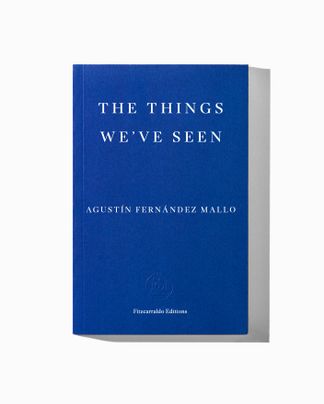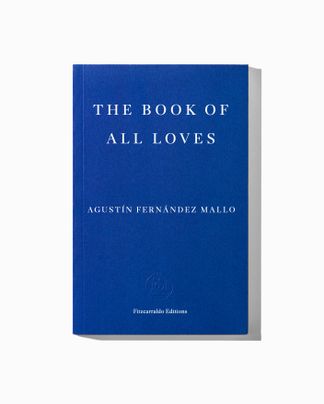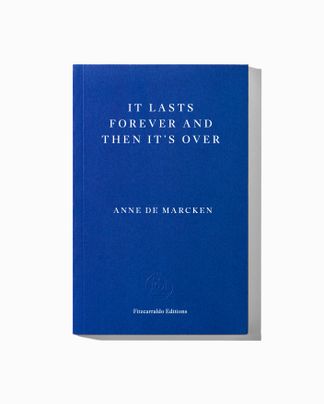Somewhere in Spain, Marc, an avid reader of the Philips Agricultural Guide, pegs mathematical formulas to clotheslines on the roof of an 8-storey building. In London, the artist Jodorkovski spends hours painting tiny vignettes on chewing gum stuck to the pavements. In Miami, Harold spends his days devouring every box of Corn Flakes with his ex-wife’s birthday as its sell-by-date. Meanwhile, in Corcubión, Spain, Antón is working on an audacious theory about the shared properties of barnacles and hard disks. These are some of the narrative strands that make up this arborescently structured novel, the second instalment in the Nocilla Trilogy, hailed as one of the most daring experiments in Spanish literature of recent years. Full of references to indie cinema, collage, conceptual art, practical architecture, the history of computers and the decadence of the novel, Nocilla Experience picks up where Nocilla Dream left off, presenting us with a hidden and exhilarating cartography of contemporary experience.
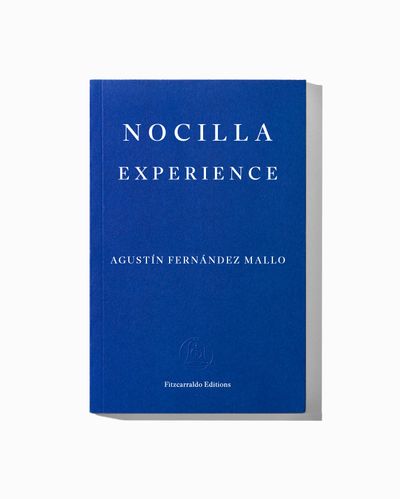
Nocilla Experience
Translated by Thomas Bunstead
Published 1 November 2016 | French paperback with flaps, 200 pages
Winner of the 2022 Europese Literatuurpijs
Nocilla Experience
Translated by Thomas Bunstead
1
How could I have been the one to come up with the Theory of Relativity? I think it must have been because I was a late developer.
Albert Einstein
2
Then they found a body floating face up in the lake, and the right eye, the only one it had left, was open and showed no sign of trauma. The volume of the body, due to the water it had absorbed, and to the high density of chemicals in the lake and the different fauna and flora that had formed inside the intestines and other passageways of the deceased, had multiplied by almost 2. Body-sponge. Teabag. In life we absorb the past and we take in air; when we die, we are entered instead by chemicals and organisms, and by things breeding, and by the future – though a future worthless to us now. And then nothing. From the rooftop terrace, the backs of cars can be seen as they advance down the wide one-way street to the waterfront shipyard. They cannot come back along it, nor will they be able to – not one.
3
Sandra flies from London to Palma de Mallorca. Barely 1 hour, the orbit of the Earth on pause. She flicks through the in-flight magazine, British Airways News. Reports on wine production in Ribeiro and Rioja, the latest hightech architecture in Berlin, mail-order Majorica pearls. A tear falls onto a photo of a Caribbean beach, but the beach has not pricked it from her, and neither has the Caribbean, nor the gravity to which all tears are subject. She looks out the window, looks ahead, sees neither clouds nor earth. Here, the verification of something she already knew: on aeroplanes, there is no horizon.
4
Marc studies the book with care, Philips Agricultural Guide: 1968. An old possession of his father’s that he kept. He glances out at the roof terrace through the door of the hut in which he lives. A shed at the top of an 8-storey building which he has assembled over time using sheets of corrugated iron, oil drums, pulverized cardboard and asbestos offcuts. All put together in such a way that the 4 walls have become mosaics of chopped-up words and icons – La Giralda oil, Repsol lubricants, Drink Pepsi, sanitary ware by Roca. Sometimes he looks at them and, from this welter of logos and brands, tries to discern maps and itineraries, as yet undiscovered traces of further artificial territories. The roof area, which none of the tenants comes up to any more, is criss-crossed by a series of clothes-lines made of wire. Rather than clothes, however, they have pieces of paper pegged to them, each with mathematical formulas handwritten on a single side. When the wind is up [it’s always up] the pieces of paper, seen front-on, form a kind of sea: a tumult of theorems in ink. Seen from behind, the blank sides of the A4 sheets seem closely symbolic of a desert – the closest symbol possible. Watching as they flutter in the wind he thinks, What a fascinating theory. He shuts the Philips Agricultural Guide: 1968, places it on the table, and goes out to take down sheets from the wires numbered 1, 4 and 7. Before going back inside he rests his elbows on the guardrail and thinks about the World Cup we’ve never won, about the fact the flattest things on Earth are train tracks, about the score to Battleship Potemkin which, studied correctly, is a version of Jimi Hendrix’s ‘Purple Haze’. Then he goes back inside the hut, which shakes when he slams the door.
5
Finally, they’ve found the weapons of mass destruction. The dictator hid them inside his body. And there was only one, neatly sown into the lining of his stomach – a capsule, 1cm3, connected to a micromechanism that he could activate via a remote control in his mind. Indeed, by simply focusing on this very precise point in his stomach, and by directing all his pulmonary and intestinal force there through an ancient yogic breathing technique, he could activate that micromechanism, releasing a poison that would kill him instantaneously. As for the mass destruction, that would ensue in a ‘cascade effect’: the wave of chainimmolations prophesied in the Alt Koran to take place at such a juncture, exactly like that other chain reaction known as ‘nuclear’. Christianity, Buddhism, Islamism and techno-secularism: gone in a flash.
(…)
‘The best novel I read in 2016. Thrillingly, incandescently brilliant.’
— Stuart Evers, author of If This is Home
‘Like having multiple browser windows open, and compulsively tabbing between them.’
— Chris Power, Guardian
‘A wonderful, mesmeric book.’
— Mat Davies, Buzz
‘Fernández Mallo occupies something of a similar position in the Spanish literary sphere as David Foster Wallace in terms of their shared insistence on the naturalization of the screen as an interface for the reception of reality.’
— Jorge Carrión, 4Columns
‘A wonderful work of avant-gardist fiction – in the line of David Markson, Ben Marcus.’
— Germán Sierra, Asymptote
‘By juxtaposing fiction with non-fiction … the author has created a hybrid genre that mirrors our networked lives, allowing us to inhabit its interstitial spaces. A physician as well as an artist, Fernández Mallo can spot a mermaid’s tail in a neutron monitor; estrange theorems into pure poetry.’
— Andrew Gallix, Independent
‘With this bitter-sweet, violently poetic dream, Agustín Fernández Mallo establishes himself as the most original and powerful author of his generation in Spain.’
— Mathias Enard, author of Zone
‘Think of [The Nocilla Trilogy] as three novels at the edge of the form, their manifold narratives folded into each other: all highly imaginative, all fairly unhinged, all methodically interrupted by a range of scientific, theoretical and literary quotations.’
— Kevin Breathnach, London Review of Books
Praise for Nocilla Dream
‘An encyclopedia, a survey, a deranged anthropology. Nocilla Dream is just the cold-hearted poetics that might see America for what it really is. There is something deeply strange and finally unknowable to this book, in the very best way – a testament to the brilliance of Agustín Fernández Mallo.’
— Ben Marcus, author of The Flame Alphabet
‘Bunstead’s translation of Nocilla Dream is great news not just for those particularly interested in contemporary Spanish literature. It is also simply a wonderful work of avant-gardist fiction – in the line of David Markson, Ben Marcus.’
— Germán Sierra, Asymptote
‘Imagine an intellectual roadtrip flick with cameos by the likes of Thomas Bernhard, Jorge Luis Borges, and Chuang Tzu, projected in a desert nightscape against a multi-fabric’d patchwork – then think again. A melodious ode to the intentionally lost and the carelessly defeated, this one’ll keep you dreaming on your feet long after it’s consumed you.’
— Travis Jeppesen, author of The Suiciders
‘Composed of 113 fragments, some narrative, some lyrical, some descriptive and some purely meditative, Nocilla Dream also brings together a wide array of writings on science and technology. Characters emerge, disappear and reemerge later in the book, allowing us glimpses of the outlines of several different lives and stories, an experience somewhat akin to channel-hopping on TV.’
— Lluís Satorras, El País
Agustín Fernández Mallo was born in La Coruña in 1967, and is a qualified physicist. In 2000 he formulated a self-termed theory of ‘post-poetry’ which explores connections between art and science. His Nocilla Trilogy, published between 2006 and 2009, brought about an important shift in contemporary Spanish writing and paved the way for the birth of a new generation of authors, known as the ‘Nocilla Generation’. His essay Postpoesía: hacia un nuevo paradigma was shortlisted for the Anagrama Essay Prize in 2009. In 2018 his long essay Teoría general de la basura (cultura, apropiación, complejidad) was published by Galaxia Gutenberg, and in the same year his latest novel, The Things We’ve Seen, won the Biblioteca Breve Prize. In 2022, he was awarded the prestigious Eugenio Trías Essay Prize for La forma de la multitud. The Book of All Loves is his fifth book with Fitzcarraldo Editions.
Thomas Bunstead writes for the Times Literary Supplement, the Paris Review Daily, and the Independent on Sunday. His short stories have been published in >kill author, Days of Roses, and Text’s Bones. He has translated Enrique Vila-Matas, Aixa de la Cruz, Eduardo Halfon, Yuri Herrera, and Rodrigo Fresán

